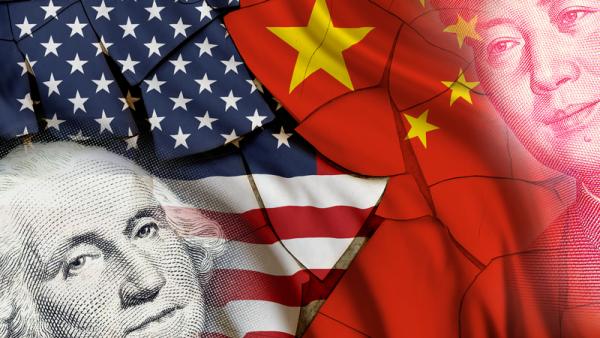William Potter / Shutterstock

Bob Carr, Director, Australia-China Relations Institute, University of Technology Sydney |
This article appeared in The Sydney Morning Herald on April 19 2019.
The US and China may be inching towards a trade deal, which is good news for whoever forms Australia’s new government. A collapse in negotiations would see both sides apply punishing, retaliatory tariffs. That would shatter confidence in a wobbly global economy and send stock markets diving.
But an agreement between the two biggest economies might be bad for us too if, as reported, China agrees over the next six years to buy a trillion dollars more in US goods by cutting back purchases from other suppliers including Australia.
If that happens the assumption of the 2019-20 budget that Australia can afford tax cuts and reach 28 years without recession might need revisiting. China soaks up one-third of our exports and access to its growth underpins our economic success.
“Let’s keep our fingers crossed,” was the cracker-barrel response of Donald Trump’s ambassador to Australia Arthur B. Culvahouse Jr, when a journalist asked him whether Australia might lose out. His lighthearted, even dismissive, tone says it all. The priority for the Trump administration is to close that $400 billion trade gap with China about which the president obsesses so deeply. In a grand settlement between China and the US the interests of Australia won’t count.
Australia’s ambassador in Washington Joe Hockey may have missed this point. He was quoted on February 3 urging America not to settle for a “pyrrhic victory” against China but, implicitly, to go all out in its trade war. Cheering the US on is not Hockey’s mission. Insisting that the two sides settle things in accordance with World Trade Organisation rules is a sounder posture and would lessen the chance that extra US access might put at risk the exports of our farms and mines.
Exports of liquid natural gas highlight the danger. It’s widely assumed that as part of a deal China will make a commitment to buy more LNG from the US. That is one of the easier issues to settle. In January 2019 China announced plans to increase its intake of LNG four-fold over the next 20 years. It will use 34 coastal terminals with a combined annual import capacity of 247 million tonnes by 2035. The world total LNG trade in 2017 was only 289 million tonnes. This is a huge market.
A deal between the two behemoths might see China allocating to the US its 20-year growth in LNG imports, denying us the share we might otherwise expect.
Take wine. US wine currently faces a tariff into China of nearly 40 percent. That includes the 25 percent increase imposed in 2018 in retaliation for US tariffs. In contrast, from January 1 this year, Australian wine has entered China tariff-free. Last year our exports shot up 18 percent with China buying 40.4 percent of our wine exports. If the US and China strike a grand trade deal that 40 percent tariff advantage Australia enjoys could fall to zero.
Australia exports beef to China worth $1.3 billion, up 60 percent over the past year with tariffs on our meat down from 12 percent to six percent. America only exports US$60 million of beef to China with tariffs at 37 percent. One risk from a US-China trade deal is that the current tariff difference in Australia’s favour could vanish (or even be reversed). And as with LNG, the US could be gifted the growth in China’s future demand that would otherwise be swelling the bank accounts of Australian cattle farmers.
Right now China seems to have shifted away from Australian coal. The Australian Financial Review quoted one Chinese analyst saying that China is cutting down on coal imports anyway, “So why not start with a country you don’t like.” We earnt that title by the way we banned one of China’s icon companies, Huawei, from supplying our 5G network. Not necessarily the ban itself – I have argued we are entitled to protect the security of our communications and am neutral about the Huawei decision because I haven’t been briefed on the security considerations.
But did we have to be the very first of American allies to lock China out? Did we have to advertise that our then-prime minister Malcolm Turnbull had phoned Donald Trump to report the decision like a puppy dog “with four paws waving and pink tummy exposed”, to quote Gareth Evans about how Australian leaders think they must show fidelity to Washington.
That we allowed someone in our security services to leak the fact that they had celebrated the Huawei decision at a dinner in Canada with other Five Eyes intelligence chiefs, even boasting that they were setting out to recruit Japan and German for anti-Huawei positions, only added to the provocation. One Australian security chief, Mike Burgess, the Director-General of the Australian Signals Directorate, even started ‘trolling’ Huawei on his Twitter account.
Meanwhile the British, New Zealanders and Canadians have kept their decision low-key and the Japanese and Germans even more so. Because of the flamboyant, forward-leaning Australian diplomacy directed at an iconic Chinese company, China may choose not to listen to an Australian plea that any extra access they give Americans to Chinese markets be open to other WTO members like ourselves.
Once in my time as foreign minister we were considering enhancing cooperation with the US but weighing carefully how it might be viewed not just by China but by Indonesia. “Our interests aren’t always the same as those of a great power”, advised Dennis Richardson who had served as head of DFAT and was then head of the Department of Defence.
I recall similarly advice from a former conservative prime minister, now deceased, Malcolm Fraser, who said, “The US is capable of going to war with China, losing and then withdrawing from Asia.” I assume he meant a real shooting war but his words might imply a trade war and one which China and the US might settle without dilating tenderly on Australian economic interests.
Author
Bob Carr, former NSW premier and Australian foreign minister, is Director of the Australia-China Relations Institute at the University of Technology Sydney.


